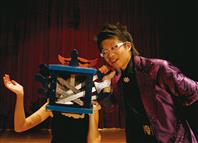Mr. Au Kam-ho graduated from the Department of Automation and Computer-aided Engineering, CUHK, in 2001. Having been a full-time magician for several years, he recently has been working as an agent for magicians and programme coordinator.
How did you become fond of magic and how did you learn it?
I didn’t know what magic was about. In primary school, I saw in movies and on television powerful wizards who could produce something from nothing. I began researching the supernatural, keeping clippings and making notes to understand why magic happens. But I couldn’t find the answer. One day in high school, my classmates and I went to Shenzhen where I saw the performance of a magician. I then found out there is ‘learnable magic’. From that time on, I started learning magic from books.
Did you perform on or off campus while at CUHK?
I was a novice. I wanted to establish a magic club in the University. Though I tried to seek like-minded friends, I could only find two. So my plan fell through. Three years after my graduation, I learnt of a magic society being formed on campus. I never performed on campus as a student. On the contrary, I volunteered to perform magic at community centres to gain more opportunities for practice.
Can you define magic?
I would say magic is: (1) a performance art; (2) something that cannot be explained by common sense; and (3) man-made.
What can a magician bring to the audience?
Like other performances, magic entertains. Its uniqueness lies in its putting on display incredible phenomena, through which the magician—the performer, conjures up joy, strangeness, sadness, etc. He can even deliver messages about art. The trick of a magic show is to make people’s mouths drop. ‘How did you do that?’
Is there any master magician that you admire?
Spaniard Juan Tamariz. He plays with cards, the most common magic trick. But even magicians can’t understand how he does it. Mr. Tamariz is humble, knowledgeable, and has his unique views about dramatic performance. His performance is an art.
Did majoring in engineering help you in your designs?
I visited CUHK on its open day before enrolling. All the robotics, laser equipments on display at the Engineering Faculty were magical in their own ways. They attracted me to the Faculty. Engineering emphasizes logical thinking and applying physics to life. A lot of magic tricks also make use of physics knowledge. My major has been very helpful in enabling me to understand what I read in magic books, and also in trick and prop designs.
Why did you become a full-time magician?
I worked at a Taiwanese integrated circuit company responsible for low-end engineering design. The workload was very heavy. It seemed that there was never time for leisure. I was drained. Waking up one morning, my arms and shoulders felt as if they were made of cement. I had to ask my mom to help me get up. That moment I told myself that I did not mind having to toil, but it must be for something worthwhile. But was my job worthwhile? So, I calculated my total living expenses for a year including money for my family. After I had saved the desired amount, I quitted. It’s funny that the pain in my arm went away a week after I left the company.
In the following year, I did different types of work, including performing magic, playing the violin, taking part in drama performances, even becoming a delivery worker. In 2006, I finally decided to be a full-time magician as that way, I can take charge of my career doing something I like.
How’s the life of a full-time magician?
Though I love magic, I was working like a dog and was stressed out. I had to look for clients, negotiate, design, and perform by myself. As every performance is targeted at a different audience, it has to be tailor-made. Once, overworked, I coughed up blood before a show.
Is that the reason you became a magician agent?
Health problems forced me to contemplate my future. But due to logistic arrangements already made, such as the studio and the props, it would be a waste to give up. Last year, the Fisherman’s Wharf in Macau invited bids for building a haunted house and recruiting artists. I had experience designing a haunted house and doing similar performances for Ocean Park, so I tendered for the contract and was accepted. In the meantime, I also secured a contract for arranging magicians to perform at Galaxy Macau. The idea of being a magician agent and programme coordinator came to my mind.
Any advice to your juniors?
My advice is to study hard, pull one’s weight, so as to gain people’s confidence that you will overcome any challenges. Don’t be impatient for the outcome. Take my case as an example, my studies helped me a lot in learning and designing magic. I keep detailed records of my performances and present them to my clients whenever necessary. They tend to trust me because I am well-prepared. And never belittle what you’ve learnt. What you’re studying hard for now may come in useful in the future. You never know. So don’t give up any chance to learn. 


































































































































































Social Bookmarks